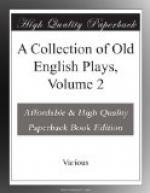Leaves 30-51 are taken up with Dick of Devonshire. Then follows an unnamed play (leaves 52-73), written in a villainous hand. If I succeed in transcribing this play I shall print it in the third volume, for it seems to be an unpublished play of Heywood’s. The next piece, entitled Calisto (leaves 74-95), which is written in the same hand, consists of scenes from Heywood’s Golden Age and Silver Age. There are many variations from the printed copies, showing that the most active of the old playwrights found time to revise his works. Here is a song that was omitted in the printed copy. Its proper place in Pearson’s Reprint of Heywood is vol. iii. p. 67:—
Whether they be awake or sleepe,
With what greate Care ought
Virgins keepe,
With
what art and indevor,
The Jewell which they ought
to pryse
Above the ritchest marchandise,—
And
once lost lost for ever!
Virginity is a rare gem,
Rated above a diadem,
And
was despised never:
’Tis that at which the
most men ayme
And being gott they count
their game
And
once lost lost for ever.
Of the charming song “Haile beauteous Dian, Queene of Shades” the MS. gives a far inferior version:—
Thou Trivia, dost alone
excell,
In heaven when thou dost please
to dwell
Cald Cynthia, Proserpine
in Hell:
But
when thou theair art fyred
And takest thy bugle and thy
bowe,
To chase on Earth the hart
or doe,
Thee for Diana all
men knowe,
Who
art mongst us admired:
Pan and Pomona
boath rejoyce,
So swaynes and nimphes with
pipe and voyce.
Off all chast vestalls thou
art queene
Which are, which heretofore
have been;
The fawnes and satyres cladd
in greene
On
earth wayte to attend thee;
And when that thou on huntinge
goest,
In which thou art delighted
moest,
They off their active swiftnes
boast,
For
which we all comend thee.
Pan and Pomona
boath rejoyce,
So swaynes and nimphes with
pipe and voyce.
We come now to a chronicle play (leaves 97-118), Edmond Ironside: The English King. This piece had a second title—A trew Chronicle History called War hath made all friends. It must be confessed that this old play is a tedious business, sadly wanting in life and movement. The following extract will give a taste of the author’s quality:—
Enter Canutus, Edricus with other Lords and souldiers.




